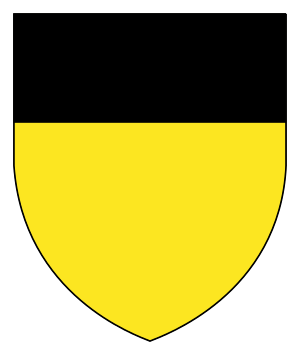Teresa d'Entença facts for kids
Quick facts for kids Teresa d'Entença |
|
|---|---|

Coat of arms of the House of Entença
|
|
| Countess of Urgell | |
| Tenure | 1314–1327 |
| Born | c. 1300 |
| Died | 20 October 1327 Zaragoza |
| Burial | Zaragoza Franciscan Church |
| Spouse | Alfonso IV of Aragon |
| Issue | Peter IV of Aragon James I, Count of Urgell Constance, Queen of Majorca |
| House | Barcelona (by marriage) |
| Father | Gombau d'Entença |
| Mother | Constança d'Antillón |
Teresa d'Entença (born around 1300, died October 20, 1327) was an important noblewoman from the Kingdom of Aragon. She was the oldest daughter of Gombau d'Entença and his wife, Constança d'Antillón. Teresa was the Countess of Urgell because she inherited the title herself. However, her husband, Alfonso IV of Aragon, managed her lands and wealth.
Her Life Story
Teresa's great-uncle, Ermengol X of Urgell, was a count who had no children. Before he passed away, he agreed that Alfonso would become the next Count of Urgell. There was one important condition: Alfonso had to marry Teresa. This was because Teresa was Ermengol's rightful heir.
Alfonso agreed to this plan. He and Teresa were married in 1314. Their wedding took place in the Cathedral of Lerida. People said that Alfonso spent a lot of money on the wedding celebrations. In fact, he spent so much that local leaders had to set limits on how much he could spend!
Teresa died on October 20, 1327, in Zaragoza. She passed away while giving birth to her son, Sancho. This happened just a few days before her husband, Alfonso, became the King of Aragon. Teresa was buried in the Franciscan Church in Zaragoza. Her younger son, James, later inherited the County of Urgell.
Her Children
Alfonso and Teresa were married for thirteen years. During their marriage, they had seven children together:
- Alfonso (1315–1317)
- Constance (1318–1346). She married James III of Majorca in 1336.
- Peter IV (1319–1387). He became the next king after his father.
- James I, Count of Urgell (1321–1347). He also inherited lands called Entença and Antillon.
- Isabella (1323–1327).
- Fadrique (1325). He died when he was very young.
- Sancho (1327). He lived for only a few days.
See also
 In Spanish: Teresa de Entenza para niños
In Spanish: Teresa de Entenza para niños
 | Aaron Henry |
 | T. R. M. Howard |
 | Jesse Jackson |

